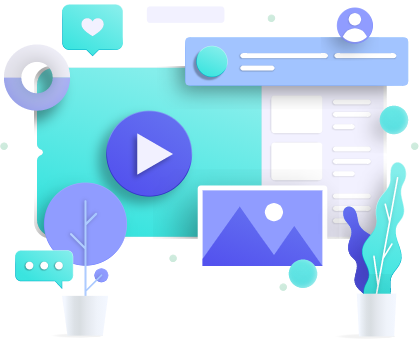Asking in 2023 why your business needs a website is like asking in the 80s or 60s why you need a brick-and-mortar store to sell your goods. It’s unfathomable, right? Today, having a business without a website is like throwing a party without sending out invitations. Imagine you have spent a lot of time and energy on bringing together everything for the party, you are chuffed about it, but in reality, no one knows you’re throwing a party. Maybe one of two of your closest people who, from word of mouth, know there’s a party would show up. But what about the wider circle of people? Do they know about the party? No, because you made no effort to tell them about it.
Until a few years ago, a website was an add-on for businesses to expand their consumer base. But now the tides have turned. Now, online presence has become the first step in attracting customers. Why? Because the majority of your consumers are starting their buying journeys online. Very few of them are out there on the streets contemplating which hair conditioner is better. Consider this: According to Zippia, 21% of global retail sales were online as of 2022, and this year, the projection is that 22.3% of total global retail sales will be online. Moreover, 63% of all shopping journeys begin online, irrespective of whether the consumer ends up buying something or not.
How can you look at those numbers and still be iffy about the utility of a website?
Why your business needs a website
What would it take to convince you that your business needs a website to flourish? Would “10 reasons to create a website” be sufficient to convince you? In that case, here are more than 10 reasons why the absence of a website might be standing between your brand being a local name or a global sensation.
Credibility
A website is a stamp of approval on a business’s credibility. It offers a face to an otherwise faceless business. Since the COVID-19 pandemic altered our lifestyles and shopping behaviors, more people first like to get a feel of the brand online before visiting its physical location.

A well-functioning website is a conversion goldmine that turns passive visitors into active buyers – a survey showed almost 45% of customers are likely to visit a company’s physical location after finding a strong online presence.
Even brands with a strong retail presence have to rely on a website to forge customers’ perceptions. ZARA has physical outlets all over the world, but can you imagine a ZARA without a website? No.
Merely having a website is not enough in today’s day and age. It must be up-to-date, functional, and responsive on both PC and mobile devices. Since most users are accessing websites on smartphones, it is vital to factor it into your web design considerations. Sweor states that 57% of internet users say they won’t suggest or recommend a business with a poorly designed website on mobile.
When we say a website ensures the credibility of a business, we mean it is so vital that it can make or break a brand’s perception. Numbers show that 88% of online customers are less likely to return to a website after a bad experience.
So, not only does a website provide a legitimate front to a business, but it also makes sure that customers find what they are looking for so that they convert into long-term and recurring consumers. A functional website ensures that your business is accessible to a broader audience. It shows you are willing to meet potential customers where they are and provide them with valuable information and services.
Global Reach
The Internet is everyone’s oasis. It has no bounds. There are 5.3 billion internet users in the world as of 2023 – over 65% of the world’s population. It means, you only need a good and viable product and a medium to sell it without worrying about where your next customer will come from because if you’re online, they would come from everywhere. Here’s how a website broadens a brand’s reach to a diverse consumer base:
No time zone barriers: Unlike physical stores or offices with opening and closing hours, a website is accessible 24/7. This means that anyone, regardless of their time zone, can visit your website, learn about your brand, and engage with your content at their convenience. This continuous accessibility breaks down geographical barriers and allows you to reach a global audience around the clock.
Multi-lingual content: A brand cognizant of diverse consumer needs creates a website with content in multiple languages to cater to a global audience. This also answers the question, “Why is content important in a website”. It is because by offering content in multiple languages, brands effectively communicate with speakers of different languages, thus giving the impression that they are committed to making their business more inclusive and aware of cultural sensitivities.
International sales: A brand with global aspirations creates an e-commerce website to serve as a global storefront. By enabling international shipping and multiple payment options, it makes it possible for customers from various countries to purchase products or services. This expands the customer base beyond your local market and into international markets.
Autonomy and customization
The importance of a website is often confused with the reach of social media pages. Businesses ask: “I have Facebook and Instagram pages, why do I need a website?” If you’re also wondering why your business needs a website, let’s first understand one thing: While social media pages can be valuable for businesses to connect with customers, they offer very limited autonomy to businesses compared to a dedicated website. Here are several reasons why a website remains essential for businesses and cannot be entirely replaced by social media pages:
Control and ownership: A website gives you full control and ownership of your online presence. With a website, you dictate the design, content, and functionality. On social media platforms, you’re subject to their rules and algorithms. They can change their policies, limit your reach, or even suspend your account without warning, potentially disrupting your online presence.
Branding and customization: Your website is a canvas for your brand identity. You can customize it as per your branding guidelines and convey a message through branding elements. On a website, you’re the artist of your branding. This is not the case with social media platforms. They offer the same limited options to every user, thus taking out the element of customization, which is vital for brands to stand out.
Comprehensive information: Websites allow you to provide comprehensive information about your business, products, services, and contact details. Social media pages typically have limited space and may not accommodate all the information potential customers need to make informed decisions.
Long-term stability: A website provides long-term stability for your online presence. Social media platforms may rise and fall in popularity, and your audience may shift between platforms. Your website remains a constant anchor in the digital landscape.
Improved Customer Service
A website considerably improves a business’ customer service. Without a website, people have to reach out to the proprietor for any information they might need about the product or service. However, a website will have a FAQ page and product description for customers’ questions.
Do you know among all people who contact a brand or company via social media for customer support, more than 30% expect a response within 30 minutes (according to Brand24), while nearly half expect a response in an hour? Handling this load of customers’ queries manually is a hassle, and as a result, 50% of customer calls go unresolved or require escalation. A business website solves this problem as well. Web designs now come with AI chatbots, which nullify the need to hire humans to reply to customers’ questions. These chatbots can do it far more effectively. The advantage of chatbots is that while humans have limited work hours, the website-integrated assistants are available 24/7 to respond to customers. This has significantly cut the customer-care costs for brands. According to an IBM report, AI-infused virtual agents can cut customer support service fees by as much as 30%.
Data Collection and Analysis
Websites provide in-depth analytics tools that give you insights into your website’s performance, user behavior, and conversion rates. These insights are crucial for refining your marketing strategies and improving user experience. Some of the invaluable insights provided by a website include:
Visitor numbers: Website analytics tools like Google Analytics provide comprehensive data about your website visitors. You can track metrics such as the number of visitors, their geographical locations, devices used, referral sources, and more. This information enables you to understand your audience better and mold your content and marketing strategies accordingly.
User behavior: Website analytics also reveal how visitors interact with your site. You can track which pages are most popular, where visitors spend the most time, and where they tend to drop off. This data helps you identify user preferences, optimize user experience, and make data-driven decisions to improve your website’s performance.
Conversion tracking: Websites allow you to set up conversion tracking, such as e-commerce transactions or specific actions like signing up for a newsletter. By analyzing the data collected from your website, you can map out the customer’s journey. This includes identifying touchpoints, conversion paths, and potential drop-off points. Understanding this journey helps you create a more seamless and persuasive user experience.
Predictive analytics: Over time, as you accumulate data, you can apply predictive analytics to forecast trends and customer behavior. This can assist in making proactive business decisions and anticipating market shifts.
Feedback and surveys: Incorporating feedback forms or surveys on your website allows you to gather direct input from visitors. This qualitative data provides insights into customer satisfaction, pain points, and areas for improvement. It helps you make informed decisions to enhance user experience and overall satisfaction.
API integrations: Websites can connect to external systems and APIs (Application Programming Interfaces) to gather additional data. For example, e-commerce websites might integrate with payment gateways to collect transaction data, which can then be used for sales analysis and financial reporting.
Cost-effective Solution
There are many reasons to start an online business, and the cost-effectiveness of a website is one of them. It costs less to set up a website than to build a brick-and-mortar store. It also cuts overhead costs like renting or purchasing physical retail space, human resources, and other bills. It not only cuts these costs but also saves the chunk of money a business would have otherwise spent on Property Insurance and Taxes. According to a breakdown of expenses, the cost of opening a retail store in the US could vary from $10,000 to a few hundred thousand dollars. These include the costs of registering your business, product sourcing, finding and purchasing a retail space, licenses, permits, and insurance and operating costs.
Compare this with the total cost to design an e-commerce website, which ranges from $30 to $30,000 depending on your business needs, as per Statrys. Add to it the domain cost, branding budget, and monthly maintenance fees, you’d still be spending less compared to the expense of a physical retail store. The point here is not to shun the physical retail store altogether and move fully to the website. The idea is to utilize both, which in every way complement each other.
Final Words
The question to ask here is not why your business needs a website. The question should be what avenues of expansion a website would open for your business. With more potential customers, lower operating costs, and invaluable data to make informed decisions, there should be no doubt about the utility of a website for big and small businesses. It provides you with a credible online face and helps form the customers’ first impression about your brand or service.




